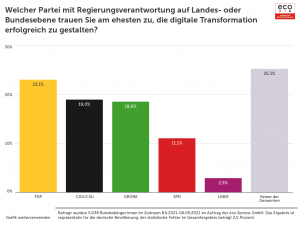eco Chair of the Board Oliver Süme calls for structural realignment of digital policy:
- Current eco Election Barometer sees FDP in the lead on digitalisation, Greens and CDU/CSU on a par, ahead of SPD, and the Left Party lagging behind
- eco calls for a Ministry of Digitalisation and focus on broadband roll-out and digital public administration
- Survey: Digital infrastructure, digital public administration and cybersecurity top issues for next legislative term
With just about three weeks to go before the German Bundestag elections, the SPD (Social Democrats) is currently well ahead of the CDU (the Christian Democrats), die Grünen (The Greens), the FDP (Free Democrats/Liberals) and DIE LINKE (the Left Party) in the voter polls. The CDU/CSU is at a record low in second place, while the Liberals are slowly catching up with the Greens. But how highly do voters rate the parties’ competences in the field of digital transformation? The Internet Policy Election Barometer, which the eco Association developed together with the market and opinion research institute Civey – together with the support of the Vodafone Institute and the member companies Leaseweb and Huawei – shows strong fluctuations in voters’ assessments in recent months. According to the barometer, an alliance of CDU/CSU, FDP and The Greens currently receives the greatest approval (over 60%) in terms of digital policy competences.* Based on the polls and an analysis of the election manifestos, eco Chair of the Board Oliver Süme explains which topics the parties must now address in order to strengthen their digital profile for the Bundestag elections:
“Digitalisation offers solutions for many of the most burning issues of the coming years, whether it is handling climate change, dealing with resources, strategies to address education deficits and social inequality, or even cybersecurity,” says Oliver Süme. From the word go, digital policy aspects must therefore be considered in all policy fields and be a strategic component of every political realignment in the next legislative term. Over the last few months, the Election Barometer surveys have shown that a consistently high proportion of respondents, amounting to approximately one third (currently circa 29%), see the topic of digital policy as being of high to very high importance for their voting decisions. “This means that a high level of digital competence could allow parties to still gain points from many voters,” Süme continues.
eco Election Barometer: FDP in the lead on digitalisation, Greens and CDU/CSU on a par, ahead of SPD, and Left Party lagging behind
Citizens currently regard the Liberals as possessing the greatest digital competence, with this perspective having improved significantly since April, rising from 18.5% to 23.1%. However, the trend is moving in the opposite direction for the CDU/CSU, who started out in the top position with 25.5% and who are now just behind The Greens with 18.7% (down from 22%). The SPD has gained a few percentage points since April (from 7.6 % to 11.3 %) but is still well behind the CDU, FDP and The Greens. The Left Party brings up the rear, with 2.8%.
From the citizens’ point of view, the next German federal government should urgently address the issues of digital infrastructure development (51.8%), digital public administration (37.5%), cybersecurity (35.2%) and digital education (31.9%).**
eco Chair of the Board Oliver Süme calls for structural realignment of digital policy
“In looking into the election manifestos of the political parties, we can see that there is broad agreement across party lines on the burning issues and challenges connected with digital transformation,” explains Oliver Süme, although there are some clear differences in the emphasis applied to various issues and the proposed strategies and measures. “It’s good to see that all parties are also responding to a wide spectrum of eco demands,” says Süme. All of the examined election manifestos have recognised the accelerated roll-out of gigabit networks as an urgent digital policy challenge and have assigned it top priority as a basic prerequisite for the success of digitalisation. High-performance digital infrastructures serve as the foundation for digital transformation. The parties also see the topic of digital identities as relevant. Measures for platform regulation and the promotion of digital sovereignty likewise play a role in most manifestos.
“Essentially, all manifestos reflect the fact that Germany will have to tackle many digital policy projects and challenges in the coming legislative term. The broadband roll-out, which has been sluggish for years, is the most difficult and biggest challenge. High-performance digital infrastructures form the foundation for further digitalisation. I am sceptical about whether further regulation, as expected by almost all parties, will actually drive digitalisation and promote competition. At the same time, this strengthens the demand that we have been making for years for the establishment of a Ministry of Digitalisation to bring together and coordinate the many digital policy threads of the future,” Süme continues. Such a Ministry would need to have the necessary competences, resources and budgets to not only develop digital policy strategies, but also to be able to implement them on a cross-departmental basis. To achieve this, Oliver Süme sees a structural reorganisation of state decision-making structures as also being necessary. In this context, a reorganisation of federal and state competences must be considered. A Ministry of Digitalisation is currently only explicitly demanded by the FDP and the CDU.
With regard to the Jamaica alliance of the CDU/CSU, the Liberals and The Greens, which is favoured by a large part of the population in terms of digital policy, the election manifestos of the three parties show a similar prioritisation and orientation of the topics of network roll-out, regulation of digital business models and platforms. The CDU and FDP also prioritise the topic of eGovernment. On the other hand, there could be potential for conflict on the topic of state surveillance, as the CDU sees data retention as necessary for purposes of domestic and security policy, while the FDP and the Greens clearly reject it from the perspective of civil rights.
One thing is clear: from the point of view of Internet politics, the Bundestag elections on 26 September and the subsequent coalition negotiations are of great significance. They will set the path for the success of the digital transformation in Germany.
*The Internet Policy Election Barometer provides a snapshot of the views of the overall population in Germany and the individual federal states on strategic digital policy issues in the run-up to the Bundestag elections. On behalf of eco, the market and opinion research institute Civey has so far surveyed 22,140 people between 12.04. and 06.09.2021. The results are representative of the population of Germany aged 18 and over. The statistical error of the overall results is 2.5 percent. The surveys will continue running until the end of September 2021.
** On behalf of eco, the market and opinion research institute Civey has surveyed 6,157 people between 02.09. and 06.09.2021. The results are representative of German residents aged 18 and over. The statistical error of the overall results is 2.5 percent. The surveys will continue running until the end of September 2021.
The Vote for Digital 2021: Further links and information
- Link to 20 Core Demands (English-language)
- Link to the full version of the Internet Policy Agenda (English-language)
- eco Election Programme Analysis (English-language)




